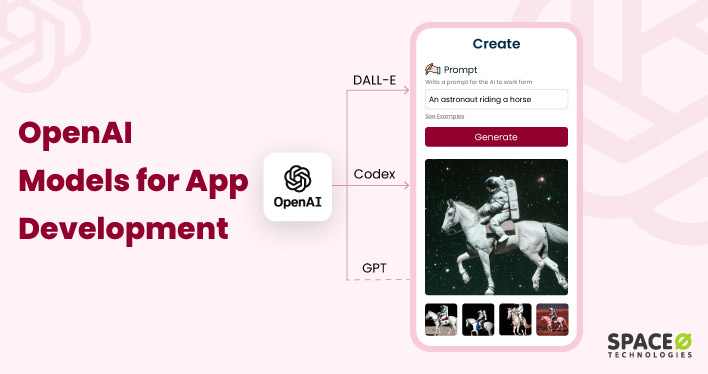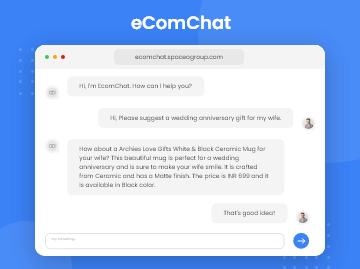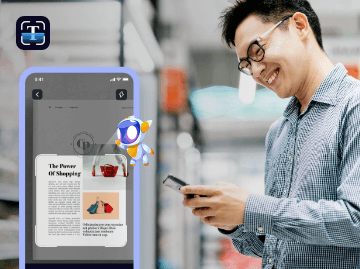Have an idea about OpenAI models? But, still, need in-depth information about each OpenAI model?
Going through this blog will end your research on OpenAI models. As a reliable OpenAI application development company, we have skilled app developers who have deeply understood these models.
So, we have written a blog on 3 important OpenAI models including GPT, Codex, and DALL.E for developing app solutions with use cases and benefits. We have even provided information on the models like Musenet, Clip, Microscope, and Whisper.
Let’s get started.
Table of Contents
3 Important OpenAI Models for App Development
Here we have described the 3 major OpenAI models for app development.
Open AI Model 1. Generative Pre-trained Transformer Model (GPT) for Content Generation
GPT is a type of language model developed by OpenAI that uses deep learning to generate human-like text. It can be fine-tuned for a variety of natural language processing tasks, such as language translation, text summarization, and question answering. GPT can be trained in different languages and it can be used for text completion, content creation, and summarization.
Benefits of Using GPT in App Development
Here are the 5 benefits of using the GPT model in app development.
Reduces development time: GPT model can be fine-tuned for specific natural language processing tasks like text completion, text generation, and sentiment analysis which can reduce the time and effort required to develop and train a new model.
For example, a news aggregator app can use GPT to automatically summarize news articles, reducing the time and effort required to manually summarize articles.
Improves user experience: Since GPT has the ability to generate human-like text, it can be used to improve the user experience in apps such as chatbots and virtual assistants.
For example, a chatbot powered by GPT can generate more human-like responses, which can make the conversation feel more natural.
Provides multilingual support: GPT model can be trained in different languages and can be fine-tuned for specific languages. With this, it can be used in multilingual apps. GPT can be a major benefit for apps that need to support multiple languages.
For example, a travel app can use GPT to translate hotel descriptions and customer reviews from one language to another, providing multilingual support to users.
- Offers reasoning ability: GPT’s ability to perform basic reasoning can be used to create more advanced chatbots and virtual assistants, which can handle more complex requests. For example, a chatbot powered by GPT can understand the context of a conversation and provide more accurate responses.
Automates content creation: GPT can generate human-like text, which can be used for automated content creation in various applications such as news and content generation. This can be beneficial for apps that need to generate large amounts of content on a regular basis.
For example, elearning platforms can use GPT to generate quizzes and assessments for their courses, allowing teachers to create assessments quickly without having to come up with questions and answers manually.
Use cases of Using GPT
- Chatbots and virtual assistants
Chatbots and virtual assistants are among the most common use cases for the GPT (Generative Pretrained Transformer) model. These applications leverage the GPT model’s ability to generate human-like responses to text-based inputs. By using the GPT model as the underlying technology, chatbots and virtual assistants can generate relevant and personalized responses to user inquiries in real time.
This makes it easier for businesses to automate customer service and support, as well as enables the creation of new types of conversational AI-powered applications that can enhance user experience and improve productivity. You can learn more about building such bots by reading our recent post on how to make a discord bot with OpenAI.
- Educational Content
GPT can be trained on a dataset of educational content, such as quizzes, flashcards, and summaries of textbook chapters. The model can be fine-tuned as per the dataset of the question and answers i.e. similar in format and difficulty level. This can be useful for educators and students who want to create new educational materials or study aids.
Looking to Develop an AI App Solution Using OpenAI?
We have skilled app developers who create feature-rich solutions as per your requirements.

Open AI Model 2. DALL.E Model for Image Generation
DALL.E is a language-based generative model that can generate images from textual input. The model is trained on a large dataset of images and captions, enabling it to learn the relationship between text and images.
Here’s an example of how you might use DALL.E:
You provide a natural language prompt to the model, such as A cute orange kitten playing with a ball. DALL-E generates an image that corresponds to the given prompt. The generated image might show an orange kitten with its ball and a playful expression on its face.
Benefits of Using DALL.E in App Development
Here are the 4 benefits of using the DALL.E model for generating images.
- Creates Multiple Image Variation
DALL.E generates multiple variations of an image based on a given prompt or uploaded image. You can even erase the parts of the image that you don’t like and request a new variation.
Generated images can have a size of 256×256, 512×512, or 1024×1024 pixels. Smaller sizes are faster to generate. You can request 1-10 images at a time using the n parameter. However, the images must be a valid PNG file, less than 4MB, and square.
- Generates High-quality Images
DALL.E uses state-of-the-art deep learning techniques called diffusion to generate images that are of high quality. It starts with random dots and gradually changes the pattern to form the desired image based on the recognized image features.
DALL.E2 generates more realistic and accurate images with 4x greater resolution. This model makes realistic edits to existing images from a natural language caption. You can rely on DALL.E to generate images that are both visually appealing and technically sound.
- Automates the Image Creation Process
DALL.E eliminates the need for manual image creation, saving time and effort. With DALL.E, you can simply provide a textual description of the desired image and the AI model will generate it automatically. This reduces the time and resources required for image creation and makes it easier for businesses to scale their operations.
- Supports Collaboration
By making image creation more efficient and accessible, DALL.E helps teams work together more effectively towards shared goals, such as developing new products or executing marketing campaigns.
DALL.E can be used to generate images for use in presentations, proposals, and other collaboration materials, further enhancing the teamwork process. Whether you’re working with a small team or collaborating with a large organization, DALL.E can help you achieve your goals and create high-quality images.
Use-cases of the DALL.E Model
- eCommerce
DALL.E can be used to generate product images for use in e-commerce sites, helping businesses improve their online sales and customer engagement. For example, eCommerce businesses can use DALL.E to generate product images based on specific requirements, such as product images with specific backgrounds, logos, or themes, helping them create a consistent and professional online presence.
- Graphic Design
DALL.E can be used by graphic designers to generate high-quality images for use in a wide range of design projects, such as logos, illustrations, and graphics. For example, graphic designers can use DALL.E to generate images like logos with specific colors, fonts, and themes, enabling the creation of impactful and eye-catching designs.
- Game Development
DALL.E can be used by game developers to generate game assets, such as characters, landscapes, and objects. For example, game developers can use DALL.E to create characters with specific hairstyles, clothing, and accessories. This helps to create immersive and engaging game environments.
Looking to Hire AI App Developers?
Contact us today. Build a scalable and cost-effective solution for your business as per your requirements.
Open AI Model 3. Codex Model for Code Generation
Codex is an AI-powered generative model developed by OpenAI that generates code based on natural language input. This model has been trained on a massive dataset of source code and generates syntactically correct and semantically meaningful code snippets for programming languages like Python, JavaScript, and C++.
For example, you want to write code in Python that calculates the average of a list of numbers. You can describe what you want to do using natural language, for example: “Compute the average of a list of numbers in Python”. Codex generates code based on this natural language input.
Here is an example of the code that Codex might generate:
return sum(numbers) / len(numbers)
If you want to know more about how to code using the Codex model, here is a video from OpenAI.
Codex helps new developers learn programming by providing them with examples of code snippets and helping them understand how different programming concepts can be used in real-world applications.
Benefits of Using the Codex Model
Here are the 4 benefits of using the Codex model for generating code using AI.
- Writes Code Faster
The Codex model is designed to help developers write code faster and more accurately, freeing up time for more important tasks. By using natural language to describe what they want to achieve, developers can generate code snippets that are tailored to their specific requirements. This can help reduce the time it takes to complete a project, reduce the risk of bugs and errors, and improve the overall quality of the code.
- Reduces Coding Stress
Coding can be a demanding and stressful task, especially when working on large projects or tight deadlines. There is a lot of pressure to write correct and efficient code, and many developers spend countless hours writing boilerplate code that can take away from more important tasks.
With Codex, this stress is significantly reduced. By generating code snippets based on natural language input, Codex eliminates the need for developers to spend time writing boilerplate code. This frees up time and reduces the risk of errors, allowing developers to focus on higher-level tasks and think creatively.
- Increases Accuracy
By using Codex, developers can reduce the risk of bugs and errors in their code, improving the overall quality of their work. This is especially valuable for complex or large projects, where manual coding can take a long time and increase the risk of mistakes.
By generating code snippets based on natural language input, Codex can help developers write code that is more in line with their specific requirements, making it easier to maintain and improve over time.
- Serves as a Learning Aid
Codex helps developers understand how certain tasks are accomplished in code. It enables developers to improve their coding skills by providing suggestions and code snippets based on natural language input.
For beginners, Codex provides a valuable introduction to programming concepts and best practices. It helps beginners understand how code works and how to write their own code more effectively.
For experienced developers, Codex serves as a reference and reminder for tasks they may not perform regularly. Instead of having to search through documentation or code snippets to find the correct syntax, Codex generates the code they need based on natural language input, freeing up time and reducing the risk of mistakes.
- Improves Code Readability
Clean and readable code is easier to maintain, debug, and scale, making it a critical factor in the success of any app development project.
By using Codex, developers generate clean and readable code that is easy for other developers to understand. Codex uses natural language input to generate code snippets, which are consistent and easy to read. This improves the overall quality of the code and makes it easier for other developers to work with.
In addition, Codex also provides suggestions for code style and best practices, helping developers write code that is both functional and readable. This improves the maintainability of the code and reduces the risk of bugs or errors.
- Integration with existing tools
Developers often use a variety of tools to help them write, manage, and deploy code. These tools can include Integrated Development Environments (IDEs), text editors, and version control systems.
Codex easily integrates with these existing tools, providing additional functionality without adding complexity to the development workflow. This makes Codex a valuable addition to any development environment, as it can help developers work more efficiently and effectively.
For example, Codex can integrate with popular IDEs, such as Visual Studio Code, to provide code suggestions and snippets directly within the development environment. This saves developers time and effort by not having to search for the correct syntax or write repetitive code snippets.
Similarly, Codex can integrate with version control systems, such as Git, to provide a common language for describing code changes. This improves communication between team members and reduces the risk of misunderstandings or mistakes.
Use-cases of Codex Model
- Continuous Integration and Continuous Deployment
Continuous Integration (CI) and Continuous Deployment (CD) are development practices that help teams deliver software faster and more reliably. Codex can be used as part of a CI/CD pipeline to automate key tasks and streamline the software delivery process.
In a CI/CD pipeline, every change to the code is automatically built, tested, and deployed to production. This helps catch bugs and other issues early in the development process and reduces the risk of problems in production.
Codex can be used to automate various steps in the CI/CD pipeline like
- Code integration: Codex can be used to automatically integrate code changes from multiple developers into a single codebase. This can help avoid conflicts and ensure that everyone is working with the latest version of the code.
- Code testing: Codex can be used to automatically run tests on code changes to ensure that they are working as expected. This can catch bugs early in the development process and improve the overall quality of the code.
- Code deployment: Codex can be used to automate the deployment of code changes to production, reducing the time and effort required for manual deployment. This can help teams deliver software faster and more reliably.
By automating key tasks in the CI/CD pipeline, Codex can help development teams work more efficiently and effectively, deliver software faster and more reliably, and reduce the risk of problems in production.
- Code Documentation
Code documentation refers to the written information that is often needed during coding. It provides information about how the code works, how to use it, and other important information that is necessary for understanding and maintaining the code.
Codex can play a role in improving code documentation by automating various tasks related to documenting code. Some of the ways in which Codex can improve code documentation are:
- Automated documentation generation: Codex can parse the code and extract relevant information such as class and method names, parameters, and descriptions, and use this information to automatically generate documentation. This can save time and effort compared to manually creating documentation, and helps ensure that documentation is accurate, up-to-date, and consistent.
- Provides consistent documentation style: Codex automates the process of ensuring that code documentation is consistent and follows a specific style. It ensures specific style guidelines for documentation are maintained, such as the use of specific headings, bullet points, and font styles. This helps ensure that documentation is formatted consistently, making it easier to read and understand.
- Offers up-to-date documentation: Codex can be configured to automatically update documentation as code changes are made. This helps ensure that documentation accurately reflects the current state of the code, reducing the risk of outdated information and making it easier to understand and maintain the code.
By automating code documentation-related tasks, Codex can help development teams improve the speed, accuracy, and efficiency of documenting code, making it easier to understand and maintain software systems and applications.
So, now you have learned about different models of OpenAI that can be used in app development. And you can expand your knowledge further by going through our post on benefits and limitations of using OpenAI. Still have doubts lets’ check faqs of different OpenAI models.
Frequently Asked Questions About Different OpenAI Models
What is the accuracy of OpenAI models?
The accuracy of OpenAI models can be influenced by various factors such as the quality and size of the training data, the complexity of the task, the model architecture, and the hardware used during training. OpenAI continuously conducts research and development to improve the accuracy of its models and stay ahead of the curve in AI advancements.
How does OpenAI ensure the ethical use of its AI models?
OpenAI has a team of researchers and engineers dedicated to ensuring the ethical use of its AI models. They work to identify potential negative consequences and implement measures to mitigate them, such as release controls for sensitive models.
How does OpenAI protect the privacy of individuals and data used to train its models?
OpenAI takes data privacy very seriously and implements measures to protect the privacy of individuals and data used to train its models. This includes using encrypted data storage and access controls, as well as implementing data use policies and contracts with partners.
Are all AI models the same?
No, AI models can vary greatly depending on the task they are designed to perform, the amount and quality of data they are trained on, and the algorithms used to develop the model.
Let’s Develop Your App Solution Using These Models
The OpenAI models offer many benefits and use cases across various industries and applications, including speech recognition, code optimization, and image processing. These models are designed to simplify and enhance processes while maintaining accuracy and security.
By leveraging OpenAI models, organizations can improve their operations and stay ahead of the competition. Also, our development team has experience in developing applications with advanced features powered with OpenAI. Take a look at some of our recently developed AI-powered applications:
AI-powered Apps Developed by Space-O
If you have an app idea and are looking for OpenAI app development services, Space-O Technologies provides these services and can help you integrate OpenAI models into your existing tools and processes. Let’s get in touch.






